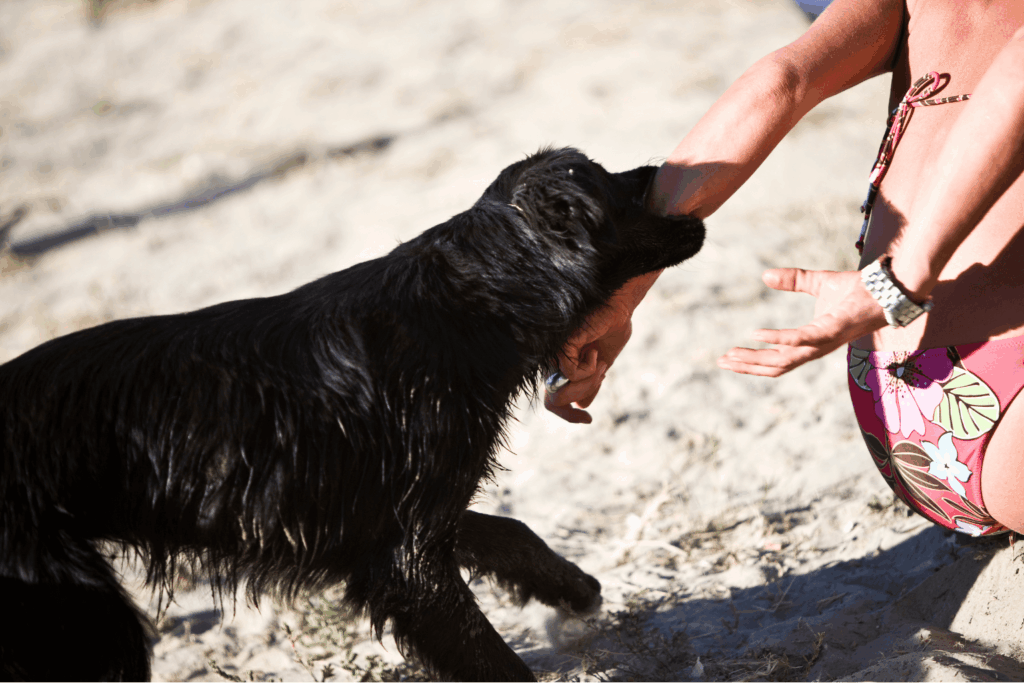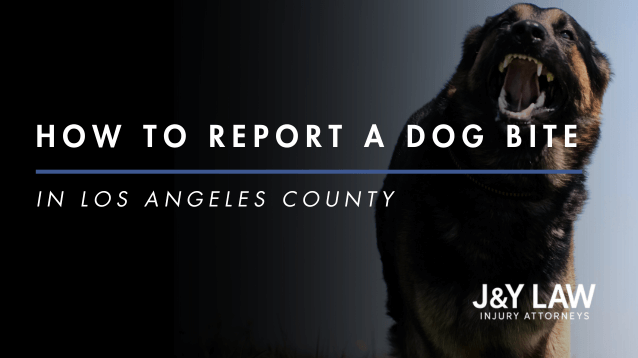How to Report a Dog Bite in Los Angeles County
If you’ve been bitten by a dog in Los Angeles County, one of the critical steps (after tending to medical needs) is reporting the incident to the proper authorities. Reporting a dog bite isn’t just a formality – it’s actually required by law in California, and it plays a big role in protecting public health and strengthening any legal claim you might pursue. Here’s what you need to know about reporting a dog bite in the Los Angeles area.
Why Reporting a Dog Bite is Important
Los Angeles County authorities need to know when bites occur for several reasons:
Rabies and Disease Control: The county must ensure the biting animal is not rabid or carrying other diseases. When you report a bite, it triggers a protocol (usually a 10-day quarantine for the dog) to monitor its health. If the dog shows signs of illness, it can be tested and public health measures (like rabies post-exposure shots for the victim) can be taken immediately.
Record of Dangerous Dogs: Reporting creates an official record. If the dog has a history of aggression, authorities can take action, such as declaring it a “potentially dangerous” or “vicious” dog under California law, which may impose requirements on the owner (like improved fencing, muzzling, or in extreme cases, euthanasia of a repeatedly dangerous animal). If no one reports bites, the county can’t identify problem animals or owners.
Evidence for Your Case: From a legal standpoint, an official bite report is solid evidence that the incident happened. It will typically document the date, time, location, parties involved, and a brief description. This kind of impartial documentation can be very useful later if there’s any dispute about the facts.
It’s Legally Required: California regulations (17 California Code of Regulations § 2606) state that all animal bites to humans must be reported to the local health officer. In practice, this means either you, your doctor, or another responsible party should notify county authorities whenever a dog bite occurs. Failing to report isn’t just risky – it could be considered a violation of public health law.
For a free legal consultation, call (424) 453-2310
Who Must Report and When
In Los Angeles County, anyone who knows about the bite can report it, but there are specific rules for professionals. Healthcare providers (like the doctor or ER that treats you) are mandated reporters – they are supposed to submit a bite report within 24 hours of treating a patient for an animal bite. Veterinarians and animal shelter personnel also have reporting duties if a bite case comes to their attention. As the victim, you can also report the bite yourself (and it’s wise to do so to ensure it is properly filed). The general rule is to report as soon as possible, ideally within 24 hours of the incident. Don’t wait weeks or months.
Contact Los Angeles County Veterinary Public Health (VPH)
This is the department that handles bite reports and rabies control. You have a few options to report:
Online: The county provides an online Animal Bite Reporting Form. You can access it through the LA County Public Health website (Veterinary Public Health section). It’s a fillable form where you input details of the incident.
By Phone: You can call the VPH bite reporting line at (213) 288-7060 during business hours (Monday-Friday, 8am-5pm). They will take the report information over the phone.
By Fax or Email: The county form can be faxed to (213) 481-2373 or emailed to vet@ph.lacounty.gov, though online or phone reporting is simpler for most people.
Click to contact our personal injury lawyers today
Information You’ll Need to Provide
When making a report, try to include:
- The date and time of the bite.
- The exact location of the incident (address or cross-streets, or park name, etc.).
- Your information (name, address, phone number) as the victim.
- Information about the dog owner (name, address, phone) if known.
- A description of the dog (breed, size, color) and the dog’s name if known.
- Details of your injury (which body part was bitten, severity, whether you sought medical attention).
- The circumstances of the bite (was the dog on leash or loose, were you on the sidewalk, did something provoke the dog, etc.).
Don’t worry if you don’t have every detail, just provide as much as you can. The form or officer may ask additional questions to complete the report.

Complete a Free Case Evaluation form now
What If the Bite Happened in an Independent City?
Los Angeles County is huge and contains many cities. The county’s VPH covers most areas, but a few cities handle their own animal control. For instance, Pasadena residents should report bites to the Pasadena Humane Society, and Long Beach has its own animal care services. If you call the county number and the location is one they don’t cover, they will usually direct you to the right agency. A quick rule: if you’re in the City of Los Angeles or any unincorporated area, report to LA County VPH. If you’re in a city with its own animal control, you can report directly to that city’s agency. When in doubt, call the county and they’ll guide you.
After You Report a Dog Bite, What Happens Next?
Once a report is filed, a few things happen:
Health Department Action: Los Angeles County VPH will assign an officer or investigator to the case. Often, they’ll contact the dog’s owner to verify rabies vaccination and order the 10-day quarantine of the dog. Quarantine usually means the dog must be kept at the owner’s home under observation (or sometimes at a shelter or kennel) for 10 days. If the dog was current on rabies vaccine and shows no symptoms after 10 days, rabies transmission is essentially ruled out. You as the victim typically won’t have to do anything during this process, but you can call VPH for an update if you’re concerned.
Animal Control Investigation: Depending on severity, animal control officers might conduct an investigation. They could interview you, the owner, or witnesses about what happened. They’ll be checking if any laws were violated (for example, was there a leash law violation? Did the dog previously bite someone and is now a repeat offender?). They will write their own report.
Possible Follow-Up: If the dog is deemed dangerous, the county can impose restrictions on the owner (like requiring the dog to be muzzled in public, or attend training, etc.). In extreme cases of a vicious dog, there are legal proceedings that can result in the dog being removed. But those are generally for dogs with multiple incidents or a particularly horrific attack.
You’ll Get a Copy: Make sure to request a copy of the bite report for your records. If you end up working with a lawyer, this report will be one of the first things they want to see. It’s official documentation of the incident.
Tips for Reporting Dog Bites
This might sound obvious but stick to the facts when giving your account. Don’t exaggerate or, conversely, downplay what happened. If you yelled at the dog or some action occurred, you can mention it, but the key elements are the dog bit you and caused injury.
If You Don’t Know the Dog or Owner: Sometimes, you might be bitten by a stray dog or a dog that ran off, and you have no idea who the owner is. You should still report it. Provide any description of the dog and the circumstances. Animal control may try to locate or capture the dog for public safety (especially due to rabies concerns). Also, if you later discover the owner or the dog is found, having that initial report already filed is useful.
Owners Must Cooperate: California law (Penal Code § 398) requires that a dog owner (or person in charge of the dog) give their contact information to the victim at the scene of a bite. If an owner refuses to identify themselves or doesn’t cooperate with the report, they are breaking the law. When you report, let the authorities know if the owner’s identity is unknown or if they wouldn’t share info – this will prompt animal control to investigate further.
Police Reports: In most dog bite situations, you do not need to call the police. Animal control (which can be part of the police department in some cities or a separate agency in others) is the correct authority. However, if a dog is actively aggressive and on the loose, or you feel in immediate danger, calling 911 is appropriate to get help at that moment. The police or sheriff can respond to secure a dangerous dog. They will then involve animal control. For the paperwork of the incident after the fact, though, it’s animal control/health department that takes the report. You can always call the non-emergency police line if you’re not sure who to report to, and they’ll redirect you.
Reporting a dog bite might seem daunting if you’ve never done it, but Los Angeles County has a clear system in place. “Reporting a bite can significantly strengthen a personal injury case down the road,” notes Arthur Dermendjian, Pre-Litigation Managing Attorney at J&Y Law. “An official report provides an unbiased account of the incident and locks in details shortly after it happened. That kind of evidence can be crucial if there’s any dispute later.” In short, by reporting, you’re doing the responsible thing for public safety and also creating a record that can support your rights as a victim.
Where Do I Report a Dog Bite in Los Angeles?
You should report it to the Los Angeles County Department of Public Health, specifically the Veterinary Public Health (Animal Bite Reporting) division. The easiest way is to use their online Animal Bite Reporting Form on the LA County Public Health website or call them at (213) 288-7060. If you’re within an incorporated city that has its own animal control (like Pasadena or Long Beach), you can report directly to those city agencies as well – but don’t worry, if you call the county and it’s not their jurisdiction, they will tell you who to contact. The key is to make sure the report is filed with an official agency; in an emergency or off-hours, you can call the city police or county sheriff, and they will connect you to the on-call animal control officer.
How Soon Do I Need to Report a Dog Bite?
As soon as possible – ideally within 24 hours of the incident. California law expects bites to be reported promptly. If you’re physically unable to report right away (for example, you were hospitalized due to the bite), have someone like a family member or the hospital staff make the report. Timely reporting is important to begin the rabies observation period for the dog and to ensure public health is protected. Even if a day or two has passed, don’t skip reporting – file it as soon as you remember or are able to. There’s no strict “statute of limitations” on reporting, but delays can complicate the process (and prolonged delays might raise questions). Within one day is best, but a bite should be reported even if it’s a couple of days later.
Do I Need to Report a Minor Dog Bite?
Yes. All dog bites that break the skin should be reported, no matter how minor. Even a small bite can pose an infection risk and, in extremely rare cases, rabies transmission. From a legal perspective, reporting even a minor bite is wise because if the dog later bites someone else, there will be a record that it has happened before. Additionally, what seems minor at first could become more serious (imagine if that “small” bite gets infected – it won’t seem so minor then). The law doesn’t distinguish between “minor” and “major” bites for reporting purposes – if a dog’s teeth broke your skin, file a report. If the bite truly is superficial and doesn’t even break skin, you technically don’t have to report, but it might be worth a call to animal control anyway to discuss the incident; they may want a record if the dog was acting aggressive.
What If I Can’t Identify the Dog or the Owner?
You should still report the incident and provide as much detail as you can. Los Angeles County animal control will take whatever description you have – for example, “large brown pit-bull mix with no collar bit me on Main Street and ran off.” They may know of stray dogs in that area or have had similar reports. Animal control officers could patrol the area to try to locate the animal. It’s important for the county to be aware that a possibly stray (and unvaccinated) dog has bitten someone. If the dog is caught later, they can tie it back to your report. Also, reporting helps document your attempt to follow the law and protect public health, which could be important if you end up needing rabies shots or pursuing other remedies. Unfortunately, if the owner remains unknown, you might not be able to pursue a personal injury claim for compensation (since there’s no identified person to hold liable). But your health and safety come first – let the authorities try to find the dog. In some cases, victims of unknown-dog bites may qualify for California’s victim compensation fund for certain expenses, so reporting is key to prove it happened.
Will the Dog or Owner Get Into Legal Trouble When I Report?
By reporting, you are simply following public health law. For a first-time bite where the injuries aren’t severe, the likely outcome is that the dog will be quarantined and the owner will be instructed on safety measures (like keeping the dog on a leash, securing their yard, etc.). The owner could get a citation if, say, they violated a leash law or failed to license/vaccinate the dog. But they won’t be hauled off to jail or anything extreme for a typical bite report. As for the dog, it will not be automatically euthanized or taken away for one bite. It will be observed for rabies, and possibly the owner will be warned or the dog evaluated for any history of aggression. Only if the dog has a history or the bite was extremely severe might further action (like a dangerous dog hearing) occur, and even then, euthanasia is a last resort. The main goal of reporting is to protect you (by addressing rabies risk and documenting what happened) and the community (by making sure this incident is recorded). The legal “trouble” that might follow – such as a personal injury claim – is something you control by deciding whether to pursue compensation. Animal control isn’t going to sue the owner on your behalf; that’s up to you. So don’t be overly concerned that you’re getting someone in huge trouble by reporting. You’re following the law and doing the responsible thing. Any consequences beyond that (like civil or criminal liability for the owner) will depend on the circumstances of the bite, not just the act of reporting.

Do I Also Need to File a Police Report or Is the Animal Control Report Enough?
Generally, the report to animal control/health authorities is sufficient. In Los Angeles County, that report will automatically be accessible to any other relevant agencies. You don’t need to file a police report for the bite itself. The exception would be if a crime occurred alongside the bite – for example, if the dog owner deliberately used their dog as a weapon to attack you, that’s an assault and you should involve the police for that aspect. But for a normal dog bite incident, animal control handles it. Police will often refer callers to animal control unless there’s an immediate threat that requires a police response. Some people choose to file a police report for documentation, and while it usually isn’t necessary, doing so won’t hurt as long as the facts are consistent. The police might take an incident report and forward it to animal control. Keep in mind that if you intend to pursue a legal claim, the animal control/health department report is the key document adjusters and lawyers will look at, not a police report. So, if you have limited time/energy (which is understandable after an injury), focus on making sure the bite is reported to the health authorities first and foremost.
Hiring a Dog Bite Lawyer in Los Angeles County
If you’ve been bitten, take the time to report the incident as soon as you can (after getting medical care). It’s a relatively simple step that carries a lot of weight. And if you have any questions about the process, or you’re getting pushback from a dog owner about reporting, you can reach out to local animal control for guidance – or contact a dog bite attorney who can assist you through the aftermath. At J&Y Law, we frequently help clients navigate the reporting process and deal with the various agencies, as part of building a strong case for compensation.
Call (866) 584-5954 for a free consultation. Let’s talk about your injury and your options after a life-changing dog bite.
Call or text (424) 453-2310 or complete a Free Case Evaluation form



